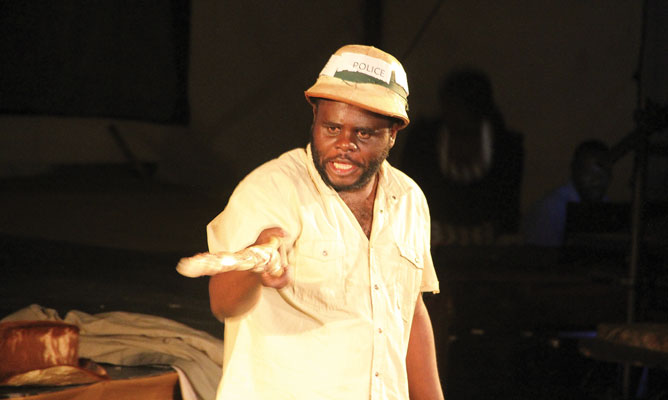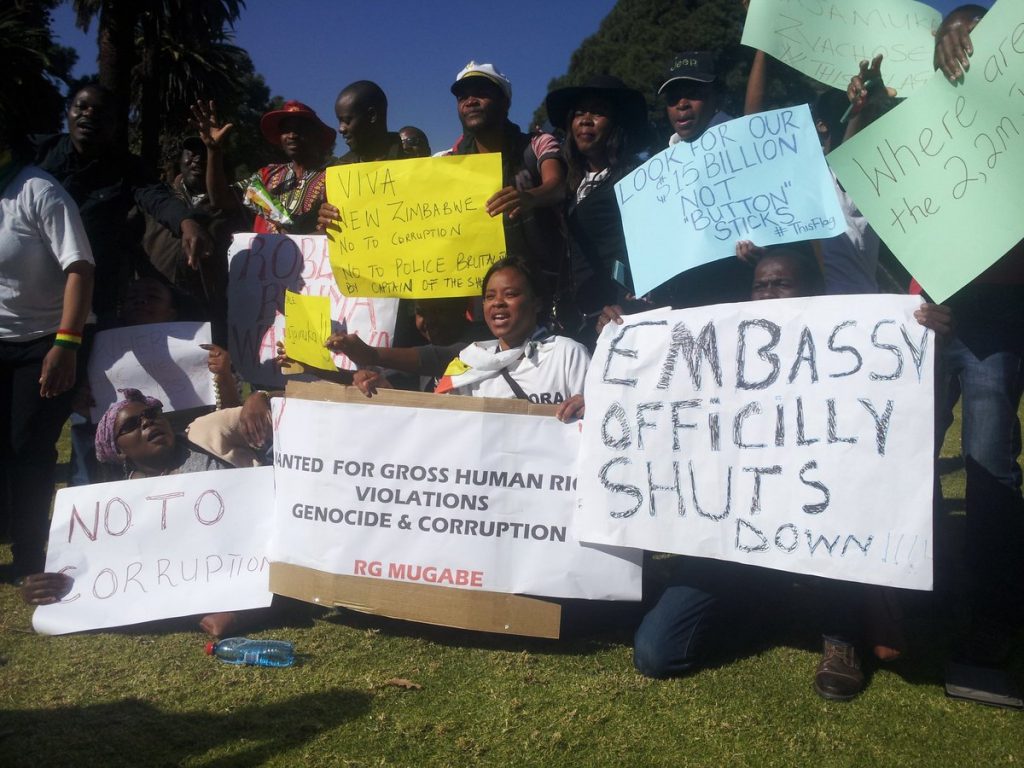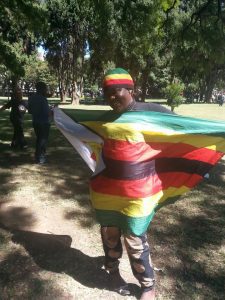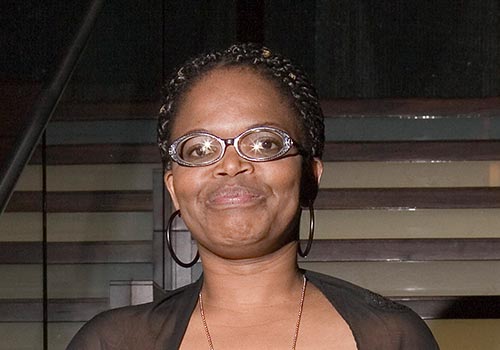Index relies entirely on the support of donors and readers to do its work.
Help us keep amplifying censored voices today.
[vc_row][vc_column][vc_column_text]This article is part of Index on Censorship partner Global Journalist’s Project Exile series, which has published interviews with exiled journalists from around the world.[/vc_column_text][vc_single_image image=”100854″ img_size=”full” add_caption=”yes”][vc_column_text]Georgina Godwin grew up in a country at war.
Born to a liberal white family in what was then Rhodesia in the late 1960s, she lived through an era of atrocities as the white-minority government of President Ian Smith battled rebels from Robert Mugabe’s Zimbabwe African National Liberation Army. An older brother Peter, now a journalist and author, was conscripted to fight the rebels in the British South Africa Police. An older sister, Jain, was killed in 1978 when she and her fiancé drove into an army ambush.
After white-rule ended in 1980 and Mugabe won election as prime minister in what was now Zimbabwe, some whites left the country. Godwin stayed and became a well-known DJ on state-owned radio, later hosting the morning television program “AMZimbabwe” for the Zimbabwe Broadcasting Corp.
By the late 1990s, that position was more and more uncomfortable. Mugabe’s government had become increasingly authoritarian and corrupt. An opposition movement led by trade unionists and backed by some whites began to grow, and Godwin felt herself increasingly drawn to opposition politics.”It felt irresponsible to be in a public position and not say or do anything,” Godwin says, in an interview with Global Journalist.
When a group of friends told her they planned to go to court to challenge the Zimbabwe Broadcasting Corp.’s monopoly of the country’s airwaves, she offered to help them start the country’s first independent radio station if they won.
In a surprise decision in 2000, the Zimbabwe Supreme Court allowed the station to go forward.
“While I was on air, getting the weather update, chatting about music, the phone call came through from the court – they have actually won the case,” she says. “I continued the show and at the end I signed off. I resigned on air and said ‘I’m really sorry, this will be my last broadcast with the Zimbabwean Broadcasting Corporation.’ I couldn’t say where I was going next because it was a secret. At that point, we didn’t know really how we were going to set it up [the radio station] or what we were going to do.”
The short-lived Capital FM began broadcasting soon afterwards from a transmitter atop a hotel roof in Harare. Within a week, Mugabe, then president, issued decree closing the station, and soldiers raided Capital FM’s studio, destroying its equipment.
In 2001, Godwin moved to London, where the founders of Capital FM set up a station called SW Africa Radio to broadcast news and information back to Zimbabwe via shortwave. Zimbabwe’s government declared her and her colleagues “enemies of the state.” Return trips to the country, where her elderly parents still lived, became increasingly nerve-wracking.
Godwin spent several years with SW Africa Radio before becoming a freelance journalist and working for a number of British news outlets. Currently, she is books editor for Monocle 24, the online radio station of Monocle magazine. She hosts the literary program “Meet the Writers” and frequently appears on Monocle 24’s current affairs shows.
Godwin spoke with Global Journalist’s Teodora Agarici about her exile from Zimbabwe and her feelings about the Zimbabwe military’s ouster of Mugabe last year. Below, an edited version of their interview:
Global Journalist: How difficult was it for you to adapt to life in the United Kingdom?
Godwin: Adapting has been really interesting. I look like the majority of British people, I’m white and I don’t have a particularly strong accent, so people look at me and they think I’m British.
But when I first arrived here, I had no understanding of how the underground network worked, the kind of cultural and historical things that people have all grown up watching on television, not even the huge class divide that you find here.
I think, particularly after Brexit, I’m very aware of the fact that I am not British, but I am a Londoner. Being in London means that we’re part of the city, but that doesn’t mean we’re British and certainly doesn’t mean that we’re part of the people who chose to really turn inward and reject the rest of the world as they did with the Brexit vote.
GJ: How do you assess press freedom in Zimbabwe now?
Godwin: Some of the old people who were writing very brave stories, they’re still carrying on. We need to salute those people who did it through the bad times when newspaper offices were being bombed, when journalists were being disappeared and beaten up.
I think it’s easier now and people do feel more emboldened to speak out and say what is going on. I’d be very interested to see in the run-up to the [July 2018] election how much they are actually allowed to say, but I think that there are some incredible journalists and correspondents doing excellent work at some cost to themselves.
As for how foreign media covers Zimbabwe, people do have a genuine choice. The internet exists, independent newspapers are publishing, and then there are all the international stations like al-Jazeera, the BBC and South African stations.
GJ: Mugabe’s former vice president Emmerson Mnangagwa is now president. He was minister of state security in the 1980s, when the security services killed up to 20,000 civilians. Do you think it’s safe for you to return now?
Godwin: I’d been there twice since I left, both times under a different passport that I no longer have access to. Because I was on television, it doesn’t really matter what names are in your passport. People recognise you from TV.
You’re basically relying on the goodwill of the immigration officer and you just have to hope that he’s not somebody that was aware of what you’ve done before or if they were aware, it was something that they approved of.
As my brother writes in one of his memoirs, he went in and the immigration officer asked, “Are you related to Georgina?”
I think he tried not to reply, but the officer quietly said, “Please tell her we listen to her every day.”
The question is now, under the change of government, would I be welcome? I’m still being outspoken about what I think. I have no personal animosity towards [President] Emmerson Mnangagwa, but I do believe what was done under his watch was absolutely criminal. It was genocide.
I’m not sure that he would welcome me into what is effectively his country at this point. But I have such wonderful optimism for the country. We’re at a time now where Zimbabweans have a real choice and I hope that what they do is not dictated by history and they don’t just vote because they’ve always been for [the ruling party] ZANU–PF.
The next generation has got something to offer and take us in a different direction. So many Zimbabweans have been suffering under the regime and finally, everybody can enjoy the fruits of the labour, of the people who fought so hard, not just the journalists, not just my colleagues, but all of the everyday people who have just fought so hard against the the deep, uncaring corruption and the people that are in charge of them.[/vc_column_text][/vc_column][/vc_row][vc_row][vc_column width=”1/2″][vc_video link=”https://youtu.be/tOxGaGKy6fo”][/vc_column][vc_column width=”1/2″][vc_column_text]Index on Censorship partner Global Journalist is a website that features global press freedom and international news stories as well as a weekly radio program that airs on KBIA, mid-Missouri’s NPR affiliate, and partner stations in six other states. The website and radio show are produced jointly by professional staff and student journalists at the University of Missouri’s School of Journalism, the oldest school of journalism in the United States. [/vc_column_text][/vc_column][/vc_row][vc_row][vc_column][vc_custom_heading text=”Don’t lose your voice. Stay informed.” use_theme_fonts=”yes”][vc_separator color=”black”][vc_row_inner][vc_column_inner width=”1/2″][vc_column_text]Index on Censorship is a nonprofit that campaigns for and defends free expression worldwide. We publish work by censored writers and artists, promote debate, and monitor threats to free speech. We believe that everyone should be free to express themselves without fear of harm or persecution – no matter what their views.
Join our mailing list (or follow us on Twitter or Facebook). We’ll send you our weekly newsletter, our monthly events update and periodic updates about our activities defending free speech. We won’t share, sell or transfer your personal information to anyone outside Index.[/vc_column_text][/vc_column_inner][vc_column_inner width=”1/2″][gravityform id=”20″ title=”false” description=”false” ajax=”false”][/vc_column_inner][/vc_row_inner][/vc_column][/vc_row][vc_row full_width=”stretch_row_content”][vc_column][three_column_post title=”Global Journalist / Project Exile” full_width_heading=”true” category_id=”22142″][/vc_column][/vc_row]
[vc_row][vc_column][vc_video link=”https://youtu.be/YgtBa8yoc80″][vc_column_text]Zimbabwean performance artist and activist Silvanos Mudzvova uses theatre to protest against the repressive regime of former president Robert Mugabe and to agitate for greater democracy and LGBT rights. 
“Artists in Zimbabwe have a lot of fear and only artists who support the regime can openly critique freely,” Mudzvova says. “However, I have started a revolution, where so many artists are producing resistance art works. I have managed to employ fellow artists to openly condemn the Mugabe regime leading to the term ‘arts activism’ becoming popular in Zimbabwe.”
Many of Mudzvova’s recent works in Zimbabwe have involved “guerrilla” theatre. He has specialised in performing “hit-and-run” actions in public places to grab the attention of politicians and defy censorship laws which forbid public performances without police clearance.
Mudzvova has been abducted, beaten and arrested for his work. In April 2016, he put on a one-man play outside the country’s parliament. The play, Missing Diamonds, I Need My Share, was inspired by the controversy surrounding Mugabe’s admission that the country lost $15 billion to diamond companies without any legal consequences. Mudzvova was arrested as a result. In September 2016, Mudzvova was abducted from his home, beaten and left for dead for participating in the Tajamuka (We Are Rising Up) protest group.
Mudzova has been vocal about the recent political change in Zimbabwe, stating that the new government should “engage the international community and rebuild relations and above all end corruption and improve the human rights situation. He should work with opposition to create an environment conducive for free and fair elections.”

His play In Chains has been replicated in several anti-government demonstrations in Zimbabwe and across the world by Zimbabweans as a creative protest against the regime. And Mudzova himself has continued to use his position as a prominent theatre activist to post videos on his Facebook site BhanditTV.
“The nomination motives me to work extra hard for the removal of censorship laws and it has given exposure to my profile as a human rights defender,” he told Index on Censorship. “This also improves my personal security from the junta government as they now know the world is watching.”
See the full shortlist for Index on Censorship’s Freedom of Expression Awards 2018 here.[/vc_column_text][/vc_column][/vc_row][vc_row full_width=”stretch_row_content” equal_height=”yes” el_class=”text_white” css=”.vc_custom_1490258749071{background-color: #cb3000 !important;}”][vc_column width=”1/2″][vc_custom_heading text=”Support the Index Fellowship.” font_container=”tag:p|font_size:28|text_align:center” use_theme_fonts=”yes” link=”url:https%3A%2F%2Fwww.indexoncensorship.org%2Fsupport-the-freedom-of-expression-awards%2F|||”][vc_column_text]
By donating to the Freedom of Expression Awards you help us support
individuals and groups at the forefront of tackling censorship.
[/vc_column_text][/vc_column][vc_column width=”1/2″ css=”.vc_custom_1521479845471{background-image: url(https://www.indexoncensorship.org/wp-content/uploads/2017/05/2017-awards-fellows-1460×490-2_revised.jpg?id=90090) !important;background-position: center !important;background-repeat: no-repeat !important;background-size: cover !important;}”][/vc_column][/vc_row][vc_row][vc_column][vc_basic_grid post_type=”post” max_items=”4″ element_width=”6″ grid_id=”vc_gid:1521542120650-a4167fa1-ebad-5″ taxonomies=”10735″][/vc_column][/vc_row]
[vc_row][vc_column][vc_column_text]
“I was arrested in Mufakose and severely assaulted by the police for inciting people to demonstrate,” says Linda Masarira, a Zimbabwean human rights activist and director of the Zimbabwean Women in Politics Alliance, who was convicted under the country’s anti-protest laws last year.
The 34-year-old mother of five has emerged as a leading figure in the fight against president Robert Mugabe’s repressive government, a role which has made her a regular target of the authorities.
Recent protests in Zimbabwe represent a key turning point for a nation burdened by widespread unemployment, poverty and hyperinflation. Following his accession to the presidential post — the first leader since Zimbabwe gained its independence in 1980 — Mugabe has pushed through a number of controversial reforms, including the land redistribution programme implemented after the turn of the century. This had a dire effect on the country’s economy. “Since 2000, life has deteriorated by the day in Zimbabwe,” says Masarira. “By the time we reached 2007, everything was in a deplorable state and someone had to do something.”

Linda Masarira
According to a report by the development organisation Hivos, instances of violence against women in Zimbabwe rose significantly from the year 2000, sparked by the country’s “political authoritarianism” and “unprecedented economic decline”. Such violence was often politically motivated, taking the form of assault and sexual violence, and making it increasingly difficult for the women’s movement in operation at the time to function.
As well as her general opposition towards Zimbabwe’s current political regime, Masarira maintains a particular focus on issues surrounding women’s rights. In April 2016 the campaigner led a demonstration against Harare City Council following the murder of three girls whose bodies were found dumped in the suburbs of the city. She also organised a successful protest with ZWPA for the safe return of Zimbabwean women trafficked to Kuwait. After sending a petition to the Kuwaiti embassy, the women were returned to Zimbabwe within two months.
Despite the protests Masarira has been involved with thus far, the activist is well aware of the numerous difficulties women face when speaking out against injustice in Zimbabwe. “Any female politician or activist is labelled all sorts of names and discriminated [against] for wanting to behave like a man. The government hasn’t made it any easier for women to freely participate in civil and political matters as the playing ground is uneven and tainted with violence.”
The poor treatment of Zimbabwean women is a problem recognised by many. Magodonga Mahlangu, the leader of activist organisation Women of Zimbabwe Arise, has herself been arrested 70 times for speaking out against the authorities, although she has never been convicted.
“Zimbabwe is a patriarchal society and has a very repressive regime,” she says. “I had to deal with a society that thought my struggle was not acceptable for a woman and the system beat, arrested and detained me as I am perceived to be a threat to society.”
Mahlangu says that the difficulties faced by Zimbabwean women in challenging injustice were worsened by poverty, familial responsibilities and the widely held view that “a woman’s place is in the kitchen”. Mahlangu, who is frequently accused by Zimbabwean police officers of misleading the country’s women, has refused to accept the status quo; namely that women should always be obedient and never question.
“The use of strategic nonviolence and understanding how to deal and overcome fear is the only way we can change the current situation,” Mahlangu says.
In addition to her support of women’s rights, Masarira has engaged in a number of other public protests. June 2016 saw the #16DayOccupation, during which activists demonstrated outside Africa Unity Square in the Zimbabwean capital of Harare. Masarira, alongside fellow activist Lynette Mudehewe, occupied Africa Unity Square with many others to mark their dissatisfaction over a number of issues including Zimbabwe’s economic climate, rampant corruption, high unemployment levels, poor health care facilities and human rights violations.
Masarira says that following the demonstration, she and other protesters were ambushed by military police on 5 June 2016. Her finger was broken during the attack and activists had their phones taken. They were arrested on false charges of obstruction of justice on 10 June 2016 but later released on bail.
On 6 July 2016, Masarira was arrested for her involvement in a national shutdown, fronted by pastor Evan Mawarire’s #ThisFlag movement and Tajamuka (meaning “we are fed up”), an anti-government pressure group in opposition to Mugabe’s regime, of which Masarira is a founding member.
Despite the many protests that took place before Mawarire’s video, it was the passionate appeal made to the Zimbabwean people by the pastor-turned-human rights campaigner that brought activism to the forefront, encouraging millions across Zimbabwe to challenge the corrupt activities of the government.
Mawarire, whose remarks about the government led him to flee to the USA over fears surrounding his family’s safety, was arrested upon his return to Zimbabwe earlier this year. A recent statement by human rights organisation Amnesty International says that Zimbabwean authorities are looking to “make an example out of Pastor Evan Mawarire”, sending “a clear message to anyone who dares dissent”.
During the national shutdown, operations all over the Zimbabwean capital were brought to a halt in protest against social and economic grievances in the southern African nation. Masarira was severely assaulted by the police for her role in encouraging the demonstrations. She was charged with obstruction of the free flow of vehicles and pedestrians and remained in jail for 87 days, the authorities arguing that she was a state security threat. Masarira was physically and psychologically abused throughout her detention period. After leading protests among female inmates in opposition to poor prison conditions, the pro-democracy advocate was forced to stay in solitary confinement for 10 days. Her detention was later deemed illegal.
Following her release in September 2016, Masarira was convicted and sentenced to 18 months imprisonment, with a seven-month suspended sentence. The remainder of her sentence was converted to 385 hours of community service and Masarira has since appealed against her conviction and sentence.
In spite of the difficulties she has encountered in speaking out under the current political regime, Masarira vows to continue protesting against the violation of human rights and urges her fellow Zimbabweans to do the same.
“Freedom doesn’t come on a silver platter,” she says. “The future is brighter with an empowered citizenry who know their rights and can stand up against the government demanding transparency and accountability.”[/vc_column_text][/vc_column][/vc_row][vc_row][vc_column][vc_basic_grid post_type=”post” max_items=”4″ element_width=”6″ grid_id=”vc_gid:1493369816086-07ad279a-23c0-0″ taxonomies=”173, 9019″][/vc_column][/vc_row]
[vc_row][vc_column][vc_column_text]
Beatrice Mtetwa is a noted Zimbabwean human rights attorney. She received the Bindmans Law and Campaigning Award from Index in 2006 for her efforts in protecting journalists arrested by Zimbabwe’s repressive regime, headed by President Robert Mugabe. Since receiving the award, she has continued in much the same vein and gone on to scale even greater heights – defending the human rights of Zimbabwean citizens at significant risk to her own liberty. Notable cases include defending, and securing the release of, two foreign journalists from The New York Times and The Telegraph in 2008.
In that case the two journalists, Barry Bearak and Stephen Bevam, were arrested in Harare as they attempted to cover the bitterly contested – and possibly rigged – presidential elections. The charges were based on the fact that they had practised journalism without being accredited – an act that did not amount to an offence under Zimbabwean law. Mtetwa was instrumental in securing the quick release of the journalists from an uncertain period of detention as political prisoners of the Mugabe regime. In 2009, she became the first African after Nelson Mandela, to receive the Ludovic-Trarieux International Human Rights Prize for her efforts at advancing human rights in Zimbabwe.
In her attempts to protect Zimbabweans from violations of the rule of law, she has also found herself at the receiving end of targeted prosecutions. Most recently, in 2013, she was charged with “obstructing justice” during a police raid. The state alleged that she made insulting statements to officers during the raid. The specific allegations in question? That Mtetwa shouted “at the top of her voice” that the raid was “unconstitutional, illegal, and unlawful” – statements that the court found did not warrant the charges that were brought against her.
Despite this arrest, Mtetwa has not been deterred from her indefatigable efforts to hold her government accountable. In 2016, she acted to secure the release of leaders of the war veterans association taken into custody by the Mugabe regime. She has also fought for and won several other critical human rights cases for people persecuted by the Mugabe regime.
With all the instability and uncertainty surrounding the rule of law in Zimbabwe, there is one constant. The world continues to watch Beatrice Mtetwa with admiration.
Tarun Krishnakumar is a member of Index on Censorship’s Youth Advisory Board. He graduated from the National Law School of India in Bangalore and currently works with a New Delhi-based law firm on public policy and regulatory affairs with a focus on technology.[/vc_column_text][/vc_column][/vc_row][vc_row][vc_column width=”1/2″][vc_single_image image=”85476″ img_size=”full” alignment=”center” onclick=”custom_link” link=”https://www.indexoncensorship.org/2016/11/awards-2017/”][/vc_column][vc_column width=”1/2″][vc_column_text]
Seventeen years of celebrating the courage and creativity of some of the world’s greatest journalists, artists, campaigners and digital activists
2001 | 2002 | 2003 | 2004 | 2005 | 2006 | 2007 | 2008 | 2009 | 2010 | 2011 | 2012 | 2013 | 2014 | 2015 | 2016 | 2017[/vc_column_text][/vc_column][/vc_row][vc_row][vc_column][vc_basic_grid post_type=”post” max_items=”12″ style=”load-more” items_per_page=”4″ element_width=”6″ grid_id=”vc_gid:1492506428504-2e169269-81a9-1″ taxonomies=”173″][/vc_column][/vc_row]